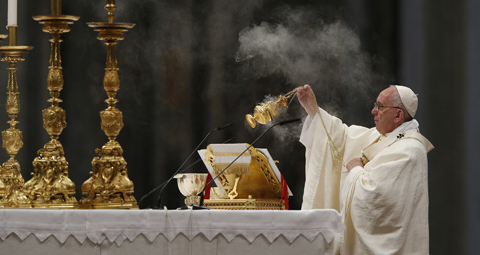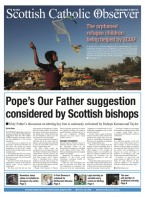December 15 | ![]() 0 COMMENTS
0 COMMENTS ![]() print
print

The wonder and awe of traditional worship
BRANON MCGINLEY finds the beauty of Mass leads to God —By BRANDON MCGINLEY
When we walked into the church for the Feast of Christ the King, the air was already so thick with incense that you could see the sunbeams coming through the stained glass windows above. I found myself unconsciously mouthing ‘wow’ as my family issued into our pew.
We are often told by those who style themselves ecclesial professionals that many if not most modern people, even and especially Catholics, do not find such experiences elevating and majestic, but rather stultifying and remote.
This is, of course, utter nonsense. It’s true that I have met people who claim to be put off by traditional aesthetics, but these complaints are always made theoretically, in the absence of the genuine article.
Bathe these people in smoke and light and they will, in spite of themselves, react instinctively with awe. And if they still complain, it will not be because they were not awed, but because they subscribe to an ideology that finds awe to be contemptibly infantile.
Therefore, to the limited extent that the professionals’ critique of worshipful splendour is not nonsense, it is a withering indictment of modern ideologies that are offended at the proper filial relationship between God and man, not an indictment of representing that relationship in awe-inspiring liturgy.
Awe is childlike in the very best way. On our long drive home from a week-long holiday with my in-laws, our four-year-old daughter spent most of her time in awe. “Look at that beautiful meadow! Those Christmas lights are amazing!” And then our two-year-old son would excitedly chime in: “I see the moon!”
That innocent, surprised wonder is one of the most beautiful and ephemeral aspects of childhood. In only a few years they will begin to understand and to practice scepticism and cynicism, and while developing the critical faculties is an essential part of maturation, something pure is lost.
We must engage the world critically, but should we take the same approach with God? Jesus speaks plainly: “Truly, I say to you, unless you turn and become like children, you will never enter the kingdom of Heaven. Whoever humbles himself like this child, he is the greatest in the kingdom of Heaven” (Matthew 18:3-4)
We are not to approach the Lord of Hosts with a questionnaire, seeking to ascertain His credibility. He is not a boss; He is not a commanding officer; He is not applying for a position in our lives; He is not the
subject of a study or a journalistic profile. He is a father. He is Our Father. He is the meadow, the Christmas lights, the moon—an object of wonder and pure desire.
The thing is, when we are too embarrassed to be childlike in relation to Jesus, we become childish. Wonder and humility and innocence are childlike virtues; petulance and haughtiness and ignorance are childish vices.
There’s no way around the filial relationship: the choice is not between approaching the Lord as a child or as a grown-up, but between approaching Him as a joyful and reverent son or daughter, or as an ungrateful brat. When we choose the latter, rather than begging Him to elevate us on His terms, we demand that He accommodates Himself to us on our terms.
So, yes, I’ll grant that fragrant sunbeams under the high ceilings of a traditional church might be a little remote from our everyday experience.
The whole scene might even feel a little unapproachable, as if we are not quite worthy of participating.
But isn’t that exactly the point? Worship is not about pulling God down to our level, but about allowing Him to pull us up graciously to His. His divine perfection is remote from us—but He can and does perfect us. We are not worthy of the Sacrament He condescends to make of Himself for us—indeed we say precisely this in the Mass—but He can make us worthy.
In response to this divine self-gift, we are to return our love, however imperfect and impermanent it might be. But there is a response that precedes that love, in time if not in importance—a response that is the seed of love because it instinctively recognises both God’s paternity and God’s gratuity. And we can articulate it in one simple word, a word that should be evoked not just by the abstract idea of God but by the physical and sensual nature of our worship of Him: “Wow.”
– Brandon McGinley is an author and an editor with EWTN Publishing.











